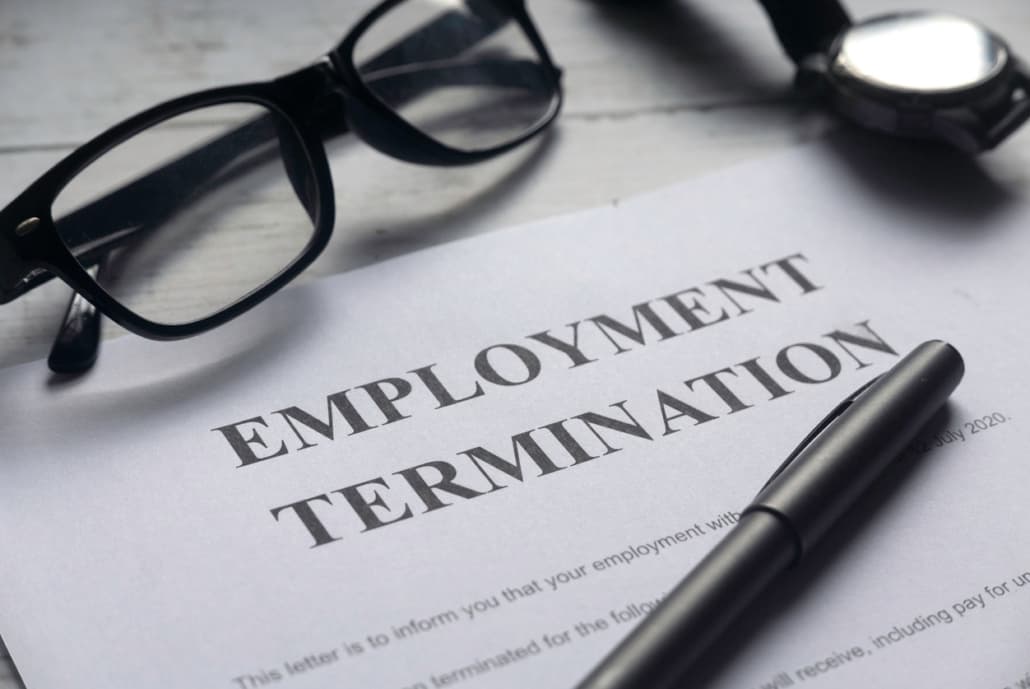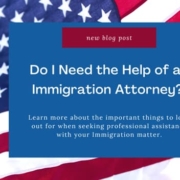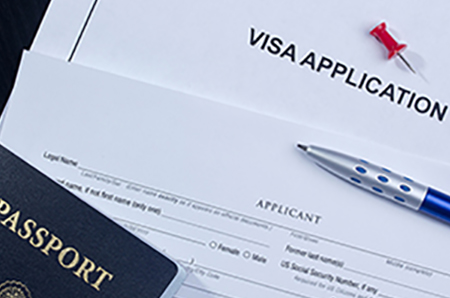What does it take to be a citizen of The United States of America? For many, being born into their citizenship means that the process was not complicated; however, for the multitude that are striving to attain it, the pathway to citizenship can feel daunting. These individuals, many times, have very real stakes involved in their case. They have a life here in the United States they maintain or are planning to begin a life here, and they do not want to sacrifice that opportunity and start over somewhere new.
One of our areas that we practice here at The Orlando Law Group is Immigration Law, and we are always surprised to see how much conversation is being had on the topic of immigration, but never much about the actual laws involved. Often, the process only feels daunting due to the fact that so little is known about what goes into getting your citizenship here in this country. For this article, we wanted to ask Nicole Payne, our attorney who has experience handling immigration cases and is very passionate about immigration law, her perspective on the pathway to citizenship. She recently helped a client naturalize and wants people to understand – the American Dream is not dead.
How did you get involved with Immigration Law?
I always say I did not choose immigration law. Immigration law chose me, and that’s because right out of law school, I started my own law firm, and I kind of had to take what came in the door. I speak Hebrew fluently, and so I was getting a lot of calls from the Israelis in the community who heard that there is an immigration attorney who speaks Hebrew, so they felt comfortable reaching out to me to help them with their cases. So I got into it at first because I was getting the calls. I took one or two cases to see how I would like it. I loved it and thought it was a very feel-good area of law for me, and so I just decided to go ahead and stick to it.
You recently helped a client gain citizenship. What was that experience like?
So usually, the clients who I’m helping get citizenship have been my clients for a long time because citizenship is the last step that is part of a very long process – years and years of different milestones along the way that we have to keep working towards and getting approvals for. So when you get to that citizenship we’re at the finish line and so excited to cross it. The clients applying for citizenship are usually ones I have built up a relationship with, so it’s extra special to me.
Even if it’s a new client, it’s very monumental. It’s a big deal to become a citizen of the U.S. This is what everybody’s goal was when they first came here, and it opens up a lot of doors for them. It’s always a great feeling, and I know my clients are very happy as well, which makes it even better.
What are some factors that you believe stop people from progressing or coming to you for help?
I think that there might be some fear involved. I think people are afraid that they might not pass the English test because they might feel like their English is not so good. They may be afraid of the civics history test. They’re trying to put it off because they are afraid that they’re going to fail the test. Other factors may include financial reasons. They don’t know which lawyer to hire and they’re just kind of comfortable where they are because they have their green cards and they’re able to work and they’re able to travel. They may be wondering what’s really the point in getting the citizenship, even though when you have your citizenship, it opens up a whole world of possibilities that you weren’t able to do before. For example, voting, having a U. S. Passport, not risking the chances of deportation if you were to get arrested.
What are some detrimental conditions that can be caused by waiting to talk to you?
I’m sure people know just from watching the news, but immigration laws change daily, so you could have a law that changes overnight that really jeopardizes you. It could be, you know, if you are afraid of taking that test well, they just changed the law that makes the test harder or the fees have increased.
You mentioned recently in a social media post that the American Dream is not dead – what did you mean by this?
I work with people from all over the world. These people have it really rough in their home countries, and all they want to do is come here, have the opportunity to make a better life for themselves and for their families. I watch these people work harder than anybody else that I know. They are working ten times harder because the American Dream is incredibly meaningful to them. So to me, that’s the American dream. It’s still very much people who are immigrating here and having more opportunities to have a better life.
When people complain about their lives here in America, I really wish that I could give them a different perspective because the immigrants that I know are so grateful for that American dream.
What are some common pitfalls you believe individuals fall into that can cause complications with getting their citizenship?
Okay, I’ll give you the most recent example is we just had an election. There’s a lot of false information out there as to whether you’re eligible to vote in election or not, and there are people who are getting terrible advice that if you are a lawful permanent resident, you can vote in a presidential election or any election. You absolutely cannot, and it’s a disqualifier for citizenship.
So right now we’re seeing a lot of that where people who have been here and have done everything that they needed to do, went through the entire legal process to come here legally and work on their path towards citizenship so they can provide this life for their family. Now they are not able to naturalize. They can’t get their citizenship because they were told some false information. That’s the biggest pitfall I’m seeing right now. People don’t really know who to trust, who to believe and there is an abundance of misinformation out there.
Another pitfall I see when it comes to citizenship is people who try to do the cases themselves and don’t submit the required documentation. They are not putting their best case forward, and it could result in major delays in their case. What would normally take under a year now is taking much longer.
What would your advice be to anyone reading this and wondering how they will begin the process?
Well, there is one easy way, and that’s just to consult with the expert like we were just talking about. You know, an expert’s advice is so invaluable. I make it really easy for my clients. I don’t want the client to stress. I don’t want them to worry. I just want them to have a very easy process where I tell them everything I need. I’ll easily lay it out on a piece of paper of what I need from them. Along as I have their documents compiled, I can put everything together, and all we have to do is get them to review. I like to have the client trust me that I will take care of everything, and that they don’t have to worry about a thing. If someone is reading this and needed advice on how to begin, I would say give me a call.
What is the difference between an immigrant petition and non-immigrant petition?
Simply put, a nonimmigrant petition is one that does not lead to citizenship. It’s for people who are here temporarily. An immigrant petition is one that can be adjusted from their current status of whatever that immigrant petition will result in, to become a lawful permanent resident, where you can then naturalized/become a citizen.
When and how can I apply for U.S. Citizenship if I am a lawful permanent resident?
It depends on how you became lawful permanent resident. If you have been a lawful permanent resident for five years, no matter how you got it, you can become a citizen. If you’ve been a lawful permanent resident because you were married and are still married to a U. S. Citizen, after three years of being a lawful permanent resident, you’re able to become a citizen. So it could be three years or five years, depending on how you got it.
What are some factors that can help my case when it comes to gaining citizenship?
This is something nobody really knows this coming into the country, but if you are a male and you are between the ages of 18 and 26 and you enlist in the military for the reserve – that is something that they ask for, and most often times people don’t do it. The attorney has to explain and justify this mistake that this person made by simply not knowing that it was a requirement of them. If the client has done it, then that’s really good.
Also, if your case is clean, where you don’t have any history of criminal arrests and you don’t have any taxes owed. Other than that, as long as you have the right documentation moving forward and you have been a lawful permanent resident for the required amount of time, then there aren’t really many issues as long as you’re able to go to the interview and pass the tests.
What would you say is one of the biggest myths when it comes to Immigration Law?
One myth that I can think of is some clients believe that showing up to a scheduled interview with an attorney is a bad look. That is a myth. Clients think that if they have an attorney there that the hearing officer will think that they are hiding something. Perhaps that’s why they needed an attorney to come to their defense? That is, quite simply, just one big myth – the idea that an attorney’s presence could have a negative impact on your case.
Rather, it’s the opposite. If you are represented by an attorney and an attorney is present at the interview with you, then you most likely will only be asked questions that are in the scope of their right to ask. I highly suggest always having an attorney present at interviews. It’s not going to jeopardize your case in any sort of way.
Do you expect any changes to occur or see any trends happening in 2021 regarding Immigration Laws?
Well, there have already been a lot of changes in regards to DACA. We’re seeing a lot of positive changes for the DACA recipients and they’re able to now apply again, which hasn’t been possible for them for a long time. So hopefully in 2021 they will provide a pathway to citizenship for all DACA recipients. That would be huge. Do I anticipate that happening? I can’t say one way or the other because it depends on who’s president and whether it’ll pass through Congress. I’m hopeful and I know that there are a lot of lobbyists out there who are advocating for these people and I do get updates on it all the time. Hopefully, we do see a lot of positive changes.
What is one of the most gratifying parts of working in Immigration Law?
The most rewarding aspect is definitely the client’s satisfaction. They seem to be extremely grateful for the success that comes about from their immigration process. When they meet me, they don’t even know if they qualify for citizenship, permanent residency, or visas. The advice that I give them and a little bit of creativity to fit them into a certain category helps to prove their case.
It’s truly rewarding to get that approval because the clients are just so happy. It’s meaningful to them. I’ve had clients invite me to their wedding. I’ve had clients bring me their babies when their babies are born to meet me. It’s really a rewarding area of law and it makes a difference in my life and the lives of my clients.
As you can see, Nicole embodies what it means to work at The Orlando Law Group. We care for our clients because we know our job is tied to their life. Gaining citizenship is a process that begins and ends with commitment. The client must be committed to the journey, and they must take the time necessary to endure. It can be a nerving process, one that may have you feeling uncertain.
That is why we are here to assist. You need someone that has experience in immigration and that will help to persevere alongside you. Nicole and the attorneys at The Orlando Law Group not only are committed to their clients, but they begin by understanding and caring for their client’s story. So very often, that is the story of hope. Many individuals dream of building a life here in The United States and together, we help that dream become a reality. For those that believe, that are willing to work with us and stay the course, their American Dream will never die, and we will never stop helping them achieve their goal of citizenship. If you are in the process of becoming a citizen and have questions – do not hesitate to reach out. Our consultations are free, and a conversation with us can only help.











